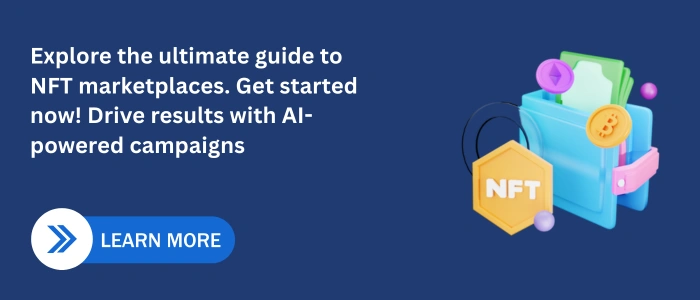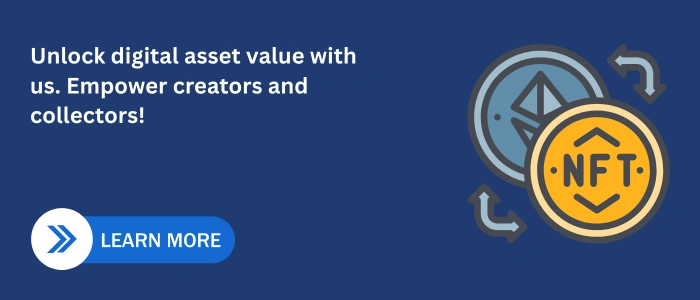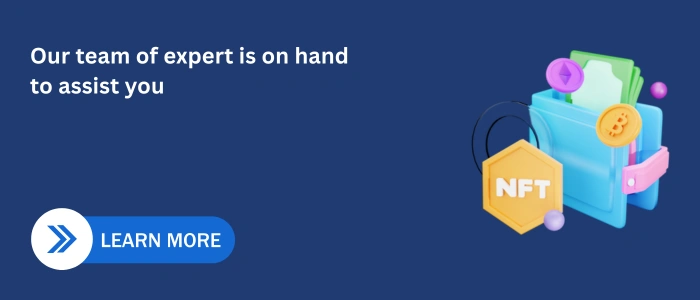Introduction
In recent years, Non-Fungible Tokens (NFTs) have become one of the most talked-about topics in the digital space. NFTs represent ownership of unique digital assets like art, music, videos, and even virtual real estate, recorded on blockchain technology. The boom in NFTs has led to the emergence of NFT Marketplace Development, where specialized platforms allow users to buy, sell, and trade these digital assets. These marketplaces play a pivotal role in the NFT ecosystem, acting as digital auction houses for a wide variety of tokens. As the demand for NFT Development continues to grow, the significance of these platforms is only set to increase. But what exactly is an NFT marketplace, and how does it work? In this blog, we will explain the fundamentals of NFT marketplaces, explore how they function, and discuss the various types available to users, along with some popular examples.
NFT Marketplace Explained: Believe you have one dollar and decide to exchange it with a friend. After the exchange, you will still have one dollar of the same value, and your friend will also have one dollar of the same value.
This is because a dollar and money, in general, are fungible goods, like shares of a company; regardless of which stock exchange you buy a share of IBM from, the market determines its value.
However, things change dramatically if you exchange an NFT with a friend. After the exchange, the NFT you will have will differ from the NFT you gave away.
This is because an NFT is a non-fungible entity by definition: it is unique, distinct, and cannot be replaced or divided. Every NFT is powered by algorithms and meta-data, making it unique and special. If you have an NFT, you are the sole owner of that entity worldwide.
Let’s decode NFT and NFT marketplaces in this blog and understand the top features and types of NFT marketplaces.
Let’s jump right into the thrilling world of NFTs!
What Exactly is the NFT Marketplace?
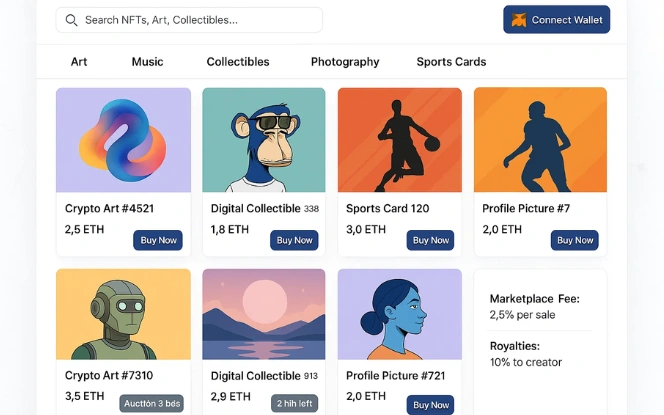
An NFT marketplace is a website where you can buy, sell, and trade NFT tokens. It provides a direct way for creators to sell non-fungible assets such as artwork, and customers can purchase these assets using cryptocurrency.
Anyone can sign up for an NFT marketplace, link their crypto wallet to the market, and begin trading. The marketplace will frequently include listings for various types of NFTs, such as art, collectibles, domain names, music, photography, sports trading cards, etc.
You will usually be given the option to buy or sell NFT at a fixed price or through an auction. If you purchase an NFT, you can keep it in your collection, which means you have exclusive ownership of the one-of-a-kind digital asset.
Remember that NFT marketplaces will charge fees for each NFT you buy or sell. In addition, a royalty fee will also be paid to the NFT creator each time the digital asset is traded.
What is NFT?
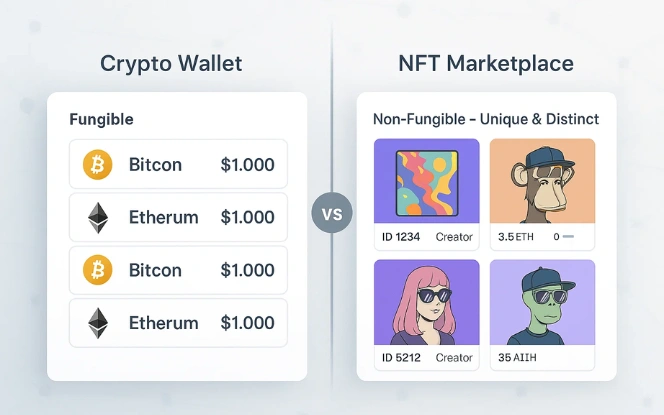
NFTs, or Non-Fungible Tokens, are cryptographic assets built on blockchain technology with unique identification codes and meta-data, making them distinguishable, distinct, and unique.
Cryptocurrencies are not distinguishable because they are identical to one another. This is why they can be traded equitably for commercial use but not NFT, which is unique. (Everything You Need To Know Concerning The NFT Marketplace)
Why Should You Use an NFT Marketplace?
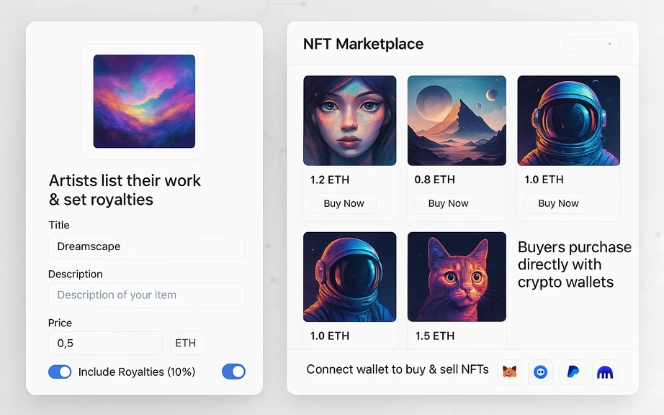
Blockchain technology and NFTs can provide artists and content creators with the ideal opportunity to receive financial compensation for their work. Artists no longer rely on auction houses or galleries to sell their work.
On the contrary, an artist could sell their work to a buyer via NFT. This also helps the artists get a more significant cut of the profits.
Interestingly, NFTs can include royalties, which give the original artist a cut of sales of their work after they die. Many people who want to find the best NFT market want to know how to start an NFT collection.
Potential buyers may be looking for ways to purchase NFTs. So, let us look at what goes into making NFTs available for selling and buying –
You will need a digital wallet to hold NFTs and Bitcoin to conduct financial transactions on your preferred blockchain platform.
Purchase cryptocurrencies, such as Ether or another currency supported by your chosen NFT provider.
PayPal, Coinbase Wallet, eToro, and Kraken are just a few services that accept credit cards for cryptocurrency purchases.
Any user might move their cryptocurrency from the exchange to their preferred wallet.
How Does the NFT Marketplace Work?
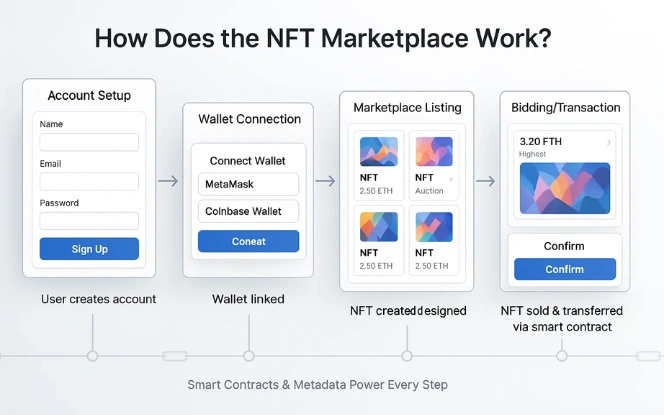
Here are the ten steps that demonstrate how the NFT marketplace works:
• The user sets up a new account.
• That account is linked to a cryptocurrency wallet
• On that marketplace, users can create NFT.
• NFT is designed for that market.
• NFT is available for purchase.
• The marketplace, as well as the NFT listings, are moderated.
• NFTs appear in the marketplace for sale.
• There are bids for that NFT.
• NFT is sold to the highest bidder.
The transaction is handled by the marketplace using a cryptocurrency wallet.
Behind the scenes, the marketplace generates a blockchain-based contract for each listed NFT. Then, the tokens are added to the unique data form known as metadata, from which the NFT’s unique parameters are derived.
Every NFT marketplace uses a unique transaction protocol known as smart contracts to regulate, monitor, and approve transactions between the buyer and seller.
Such smart contracts have unique parameters associated with NFTs, ensuring that the owner of any given NFT is the only one in the entire Universe!
The Best Features of the NFT Marketplace
NFT marketplaces serve a specific purpose: they allow users to buy, sell, and trade their digital collectibles and assets in the most convenient way possible.
To ensure this, NFT marketplace developers incorporate some globally accepted and recommended features into the NFT marketplace.
Among the top Features are
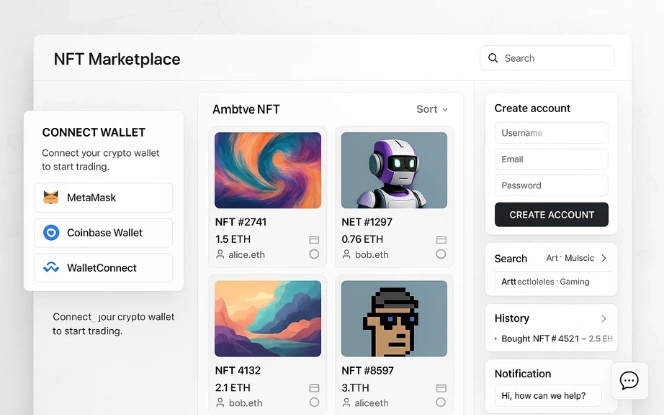
Wallet for Cryptocurrency
As previously stated, every NFT transaction must take place through a crypto wallet, which is why this is an important, required feature of any NFT marketplace.
For seamless transactions, the user should be able to sync and integrate their crypto wallet with the NFT marketplace. Metamask, Coinbase, and WalletConnect are three popular crypto wallets for NFT marketplaces.
Shop Display
The NFTs listed on the marketplace should display all critical information in the best possible way: name, price, description, owner, payment method, and so on. NFT marketplaces that show this shop window optimally will have a higher chance of triggering sales.
The Registration Procedure
New users should be able to create new accounts easily and then integrate their existing cryptocurrency wallets into the platform. In addition, if the user does not already have a crypto wallet, they should be able to create one immediately.
Capabilities for Search
NFT marketplace should have a powerful and feature-rich search engine that allows users to quickly find NFTs related to music, videos, photography, art, memes, gaming characters, and other topics. The search algorithm should be able to detect the user’s desired intent and objective and display the appropriate information in real time.
History of Users
The NFT marketplace should be able to record, store, and display a user’s entire history on the platform, including trading data, transaction history, and NFTs listed, approved, bought, and sold. To enable this feature, the platform must include comprehensive user management.
Alerts
Users should be able to receive notifications and alerts from the NFT marketplace based on their search and transaction history. If a new NFT is listed, for example, the user should be able to receive an instant notification about it.
Customer Service
The NFT marketplace should include a comprehensive and detailed customer support mechanism, such as live call/chat or a Knowledge Center, to ensure that every query and question from the user is resolved.
We can assist you immediately if you want to launch your NFT marketplace and need expert NFT marketplace developers. Contact our knowledgeable NFT app developers to take the first steps toward dominating the ever-expanding NFT market.
List of the Best NFT Marketplaces
The NFT market is an integral aspect of the revolutionary new development of NFTs. By eliminating the challenges with conventional revenue streams, NFT markets have made it simpler and more versatile for producers to access NFTs.
However, all discussion about NFT marketplaces ultimately boils down to one question. The issue of “what is the greatest NFT marketplace?” is one that both NFT makers and purchasers will want to know the answer to.
Even more alarming is the exponential growth of some NFT marketplaces. In such a circumstance, a complete description and an organized summary of the most popular NFT marketplaces might be helpful. So, to help you forge new ground in the NFT world, we’ve compiled a list of popular NFT marketplaces.
Explore our other insights!
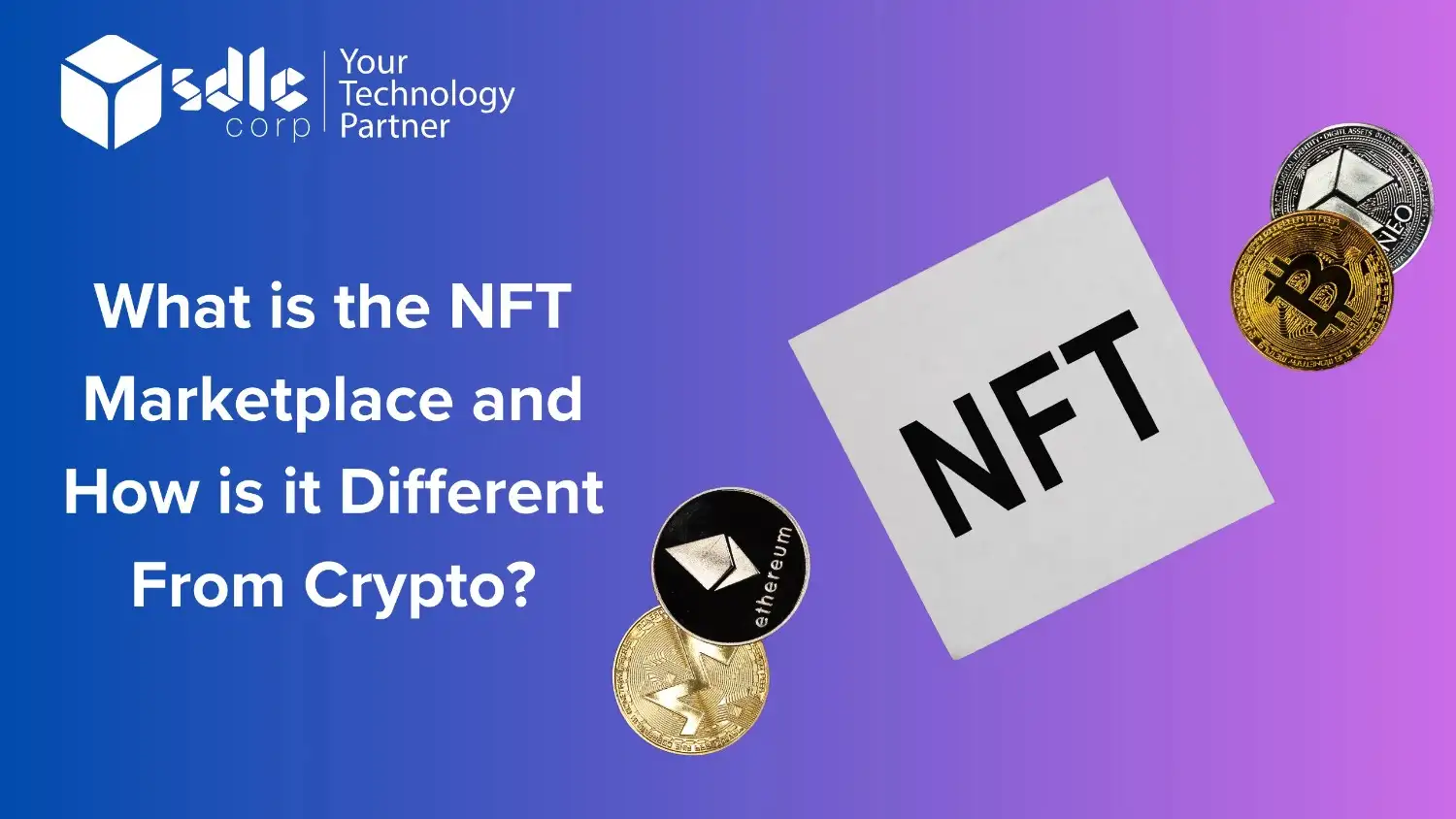
What is the NFT Marketplace and How is it Different From Crypto?
Introduction The NFT marketplace is a digital platform where users can buy, sell, and trade unique digital assets,
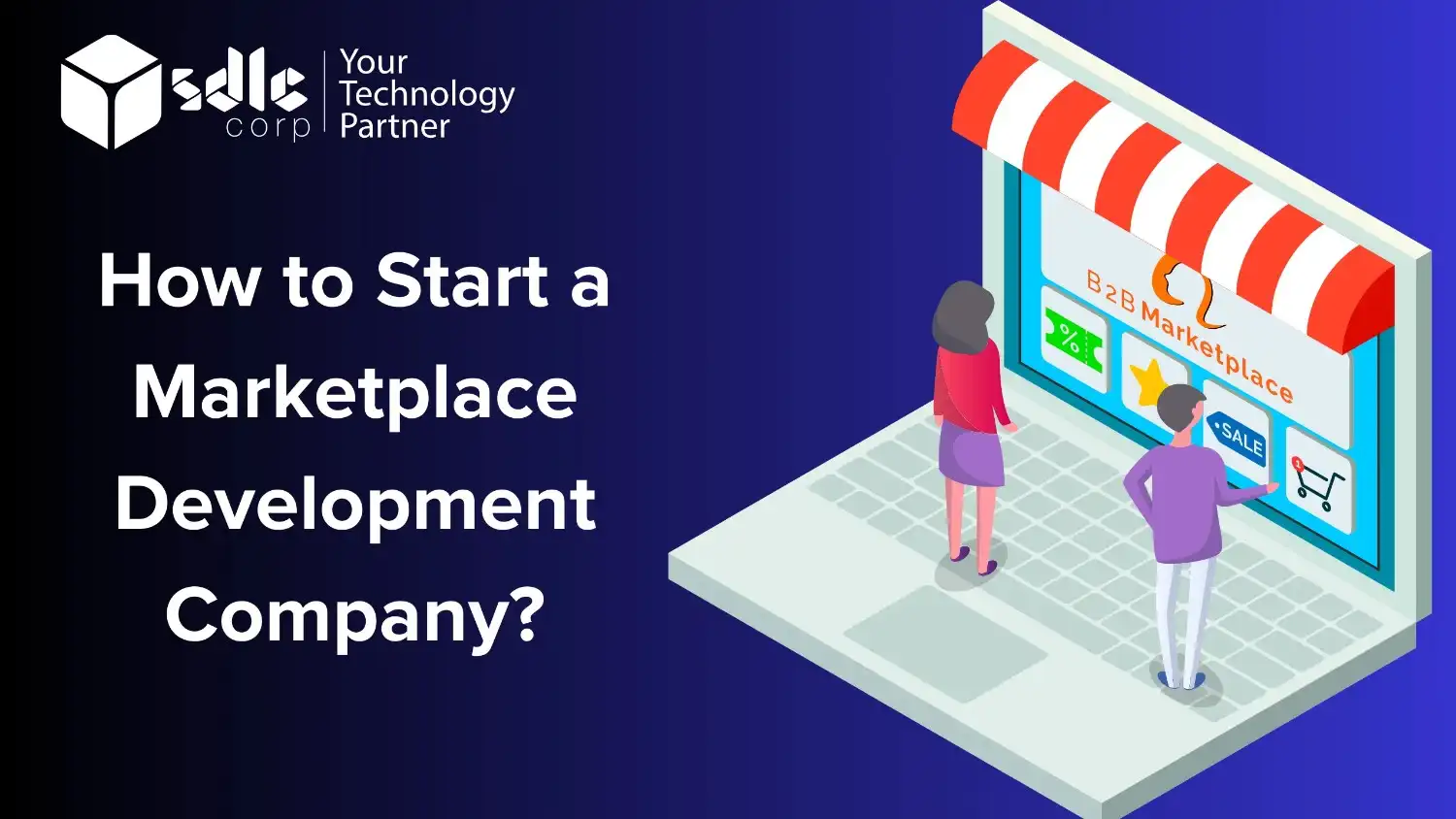
How to Start a Marketplace Development Company?
Introduction Start a Marketplace Development Company: As the founders of SDLC, we’ve seen our fair share of online
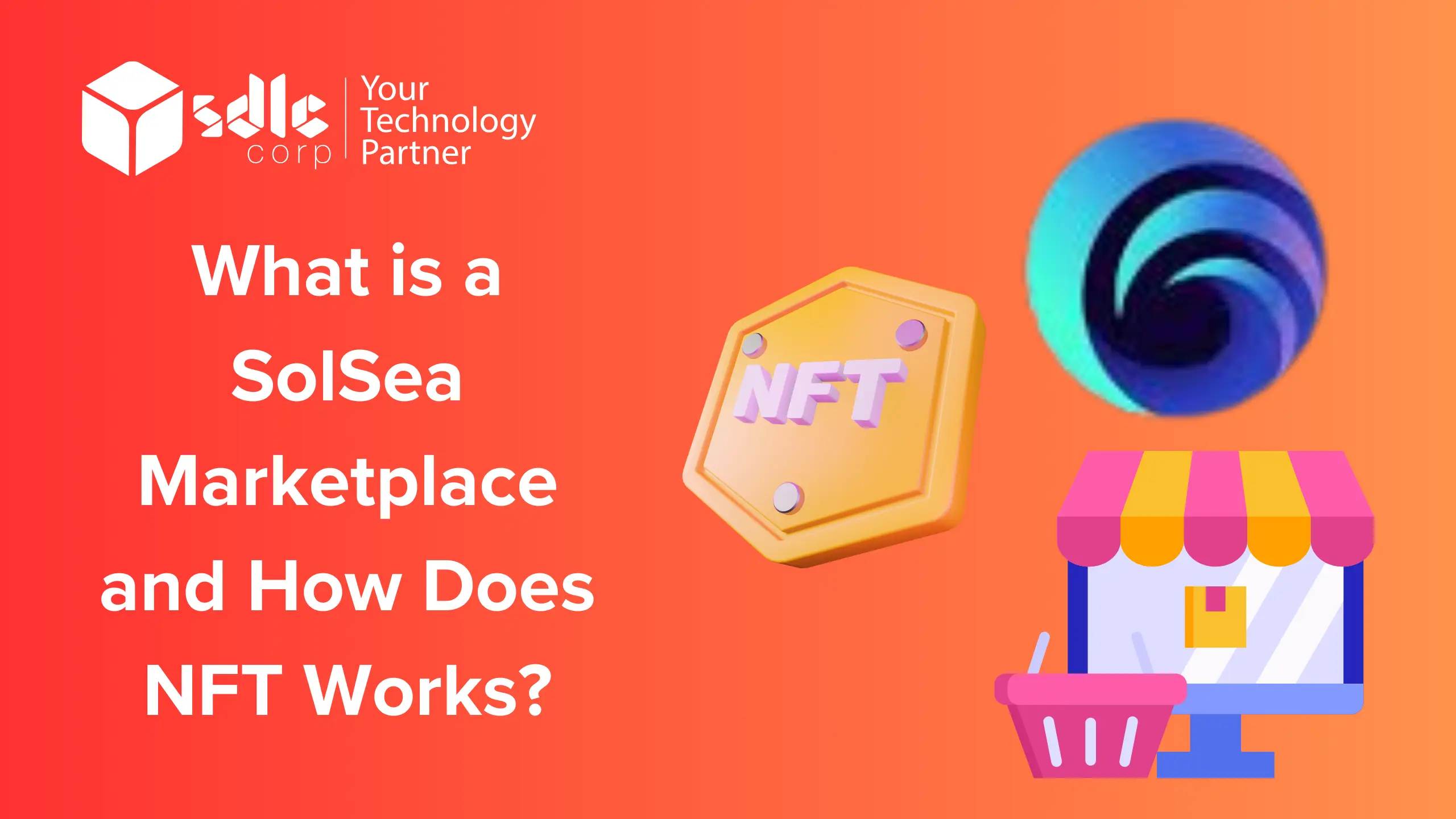
What is a SolSea Marketplace and How Does NFT Works?
Introduction Solsea Marketplace is one of the leading decentralized NFT (Non-Fungible Token) platforms built on the Solana blockchain,
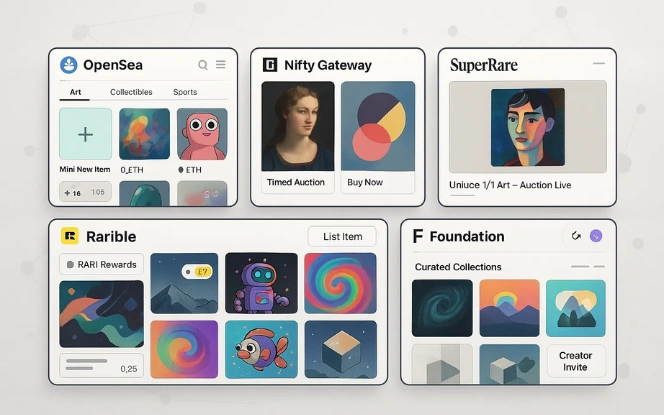
1. OpenSea
OpenSea is the largest NFT marketplace and, according to current industry standards, the best NFT marketplace. It features many non-fungible tokens, such as those related to art, MMORPGs, and sports.
PRO domain names (which can’t be deleted), trading cards, and collectibles. Interestingly, OpenSea supports ERC1155 and ERC721 tokens as assets.
It lets you buy, sell, and explore exclusive digital assets like Decentraland, Axies, CryptoKitties, ENS names, and others. The roughly 700 projects already hosted on OpenSea range from digital art to trading card games to naming systems like Ethereum Name Service (ENS) and collectible games.
OpenSea’s item mining tool is among its most appealing aspects as an NFT marketplace. Creators can develop their goods for their NFT collections using the minting tool. As a result, OpenSea is an ideal marketplace for developers working on their smart contracts for games or digital collectibles.
2. Nifty Gateway
The following most likely answer to the question ‘What is the best NFT marketplace?’ is Nifty Gateway. This NFT market is one of the most prestigious sites to buy and sell high-end crypto artwork.
Nifty Gateway has benefited from partnerships with prominent creators, companies, athletes, and artists. The partnership brings one-of-a-kind works exclusively to crypto art collectors.
However, getting accepted on Nifty Gateway is challenging regarding crypto art marketplaces. This means that established musicians, brands, and celebrities may all benefit from using the service. Three different types of auctions are available on the platform: silent auctions, “Buy It Now,” and timed auctions.
Royalties are also supported on Nifty Gateway, with creators able to determine what share of proceeds they want from the resale. In addition, it is a leading NFT marketplace that accepts payments from debit cards, credit cards, and Ether.
3. SuperRare
Another perspective NFT marketplace that comes to mind is exceptionally uncommon, but it is one of the better choices. The site’s primary function is to provide a venue for the sale and purchase of unique, numbered works of digital art. Again, a super rare network artist creates genuine artwork.
The artwork is tokenized as a collectible or crypto asset on the site, making it accessible for purchase and sale. SuperRare has been praised by many in the collectibles business for redefining the online collecting experience. The social network development over the marketplace is the standout feature of super rare.
Since digital collectibles come with a traceable history of ownership, they could work well in a group context. Artists just starting who have an eye for originality and ingenuity will find a home in SuperRare. To be specific, it works with Ether, the coin used by the Ethereum network.
4. Rarible
Any discussion of the top NFT marketplace would be complete if the name Rarible were mentioned. It is a straightforward and easy-to-use NFT platform with few barriers to becoming an artist. As a result, people just getting started in the field of NFT can benefit from Rarible.
However, the user experience could be better due to the messy design. RARI, the token used in Rarible, is one of its most intriguing features. RARI is useful for rewarding active platform users.
It operates on the Ethereum blockchain, charges 2.5% transaction fees, and accepts cryptocurrencies other than RARI and ETH, such as WETH, ATRI, and DAI. In addition, Rarible is a reliable non-fiat currency (NFT) market for royalties because artists can choose how much profit they want from secondary sales.
5. Foundation
Foundation is a new NFT marketplace that has received a lot of attention. As such, it has become the go-to NFT market for many crypto art developers. Collections that the community has curated are what set Foundation apart. Both makers and collectors collaborate to recruit fresh talent to the Foundation.
As a result, after selling their first NFT, creators can easily access the “Creator Invites” feature. Foundation is open to any artist who wants to make a name for themselves and stand out as a unique creator.
It accepts Ether payments and intends to introduce a new feature that guarantees a 10% royalty on secondary sales.
Wrapping Up
Conclusion
NFT marketplaces have transformed the way digital assets are bought, sold, and owned. By providing platforms for minting, trading, and collecting NFTs, these marketplaces have opened up new opportunities for artists, gamers, musicians, and other creators to monetize their work. As NFT Marketplace Development and blockchain technology continue to evolve, the future of digital ownership is set to become even more immersive and accessible. Whether you’re a creator looking to sell your art or a collector seeking unique assets, understanding the dynamics of NFT marketplaces can help you make informed decisions in this exciting space.
For expert guidance on setting up or utilizing an NFT marketplace, consider partnering with SDLC Corp, a leading provider of blockchain solutions and NFT Development services.
FAQ's
1. How do NFT marketplaces make money?
They can make money in a variety of ways. Minting fees are the fees paid by NFT creators to create an NFT. Listing fees are users’ fees to add their NFT to the marketplace for sale/trade and have it appear. Sales commissions and bidding fees typically range from 1% to 5%.
2. What type of NFT sells well?
Art is the most widely practised form of NFT. As a result, art is the type of NFT that sells the best.
3. What sells fast on NFT?
Thirty thousand collectors pooled $91.8 million (‘The Merge’) to buy shares of this NFT.
4. Should I invest in an NFT marketplace?
Investing in NFT marketplaces can involve buying NFTs as digital assets or backing the platforms themselves. It may be rewarding, but risks exist since NFT values and platform success depend on demand, regulations, and market growth.
5. Is NFT Marketplace a profitable business?
Standards to Apply before Creating an NFT Market. With all the excitement around NFT, it makes good commercial sense for companies to build NFT marketplaces to facilitate transactions between buyers and sellers. However, if you take the time to learn more about NFTs, you’ll be better equipped to choose a specific focus for your work and an appropriate development method.
6. What is the Future of NFT Marketplaces?
In 2021, NFTs will be all the rage. They will continue to be the most popular style in 2022. Rapid growth in NFT use has made possible the development of the Metaverse, an online version of the future. Create your virtual persona and explore the virtual world of Metaverse.
7.What is an NFT marketplace?
An NFT marketplace is an online platform where users can buy, sell, trade, and sometimes mint NFTs. It works like a digital auction house where creators list their tokens and buyers purchase them using cryptocurrency.

